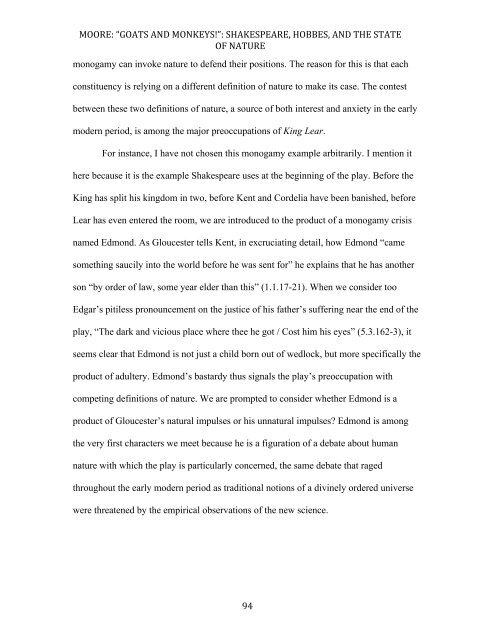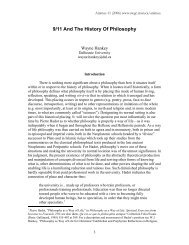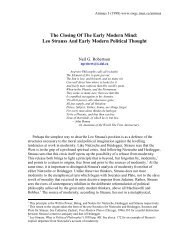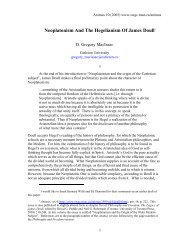âgoats and monkeys!â: shakespeare, hobbes, and the state of nature
âgoats and monkeys!â: shakespeare, hobbes, and the state of nature
âgoats and monkeys!â: shakespeare, hobbes, and the state of nature
You also want an ePaper? Increase the reach of your titles
YUMPU automatically turns print PDFs into web optimized ePapers that Google loves.
MOORE: “GOATS AND MONKEYS!”: SHAKESPEARE, HOBBES, AND THE STATE <br />
OF NATURE <br />
monogamy can invoke <strong>nature</strong> to defend <strong>the</strong>ir positions. The reason for this is that each<br />
constituency is relying on a different definition <strong>of</strong> <strong>nature</strong> to make its case. The contest<br />
between <strong>the</strong>se two definitions <strong>of</strong> <strong>nature</strong>, a source <strong>of</strong> both interest <strong>and</strong> anxiety in <strong>the</strong> early<br />
modern period, is among <strong>the</strong> major preoccupations <strong>of</strong> King Lear.<br />
For instance, I have not chosen this monogamy example arbitrarily. I mention it<br />
here because it is <strong>the</strong> example Shakespeare uses at <strong>the</strong> beginning <strong>of</strong> <strong>the</strong> play. Before <strong>the</strong><br />
King has split his kingdom in two, before Kent <strong>and</strong> Cordelia have been banished, before<br />
Lear has even entered <strong>the</strong> room, we are introduced to <strong>the</strong> product <strong>of</strong> a monogamy crisis<br />
named Edmond. As Gloucester tells Kent, in excruciating detail, how Edmond “came<br />
something saucily into <strong>the</strong> world before he was sent for” he explains that he has ano<strong>the</strong>r<br />
son “by order <strong>of</strong> law, some year elder than this” (1.1.17-21). When we consider too<br />
Edgar’s pitiless pronouncement on <strong>the</strong> justice <strong>of</strong> his fa<strong>the</strong>r’s suffering near <strong>the</strong> end <strong>of</strong> <strong>the</strong><br />
play, “The dark <strong>and</strong> vicious place where <strong>the</strong>e he got / Cost him his eyes” (5.3.162-3), it<br />
seems clear that Edmond is not just a child born out <strong>of</strong> wedlock, but more specifically <strong>the</strong><br />
product <strong>of</strong> adultery. Edmond’s bastardy thus signals <strong>the</strong> play’s preoccupation with<br />
competing definitions <strong>of</strong> <strong>nature</strong>. We are prompted to consider whe<strong>the</strong>r Edmond is a<br />
product <strong>of</strong> Gloucester’s natural impulses or his unnatural impulses Edmond is among<br />
<strong>the</strong> very first characters we meet because he is a figuration <strong>of</strong> a debate about human<br />
<strong>nature</strong> with which <strong>the</strong> play is particularly concerned, <strong>the</strong> same debate that raged<br />
throughout <strong>the</strong> early modern period as traditional notions <strong>of</strong> a divinely ordered universe<br />
were threatened by <strong>the</strong> empirical observations <strong>of</strong> <strong>the</strong> new science.<br />
94
















